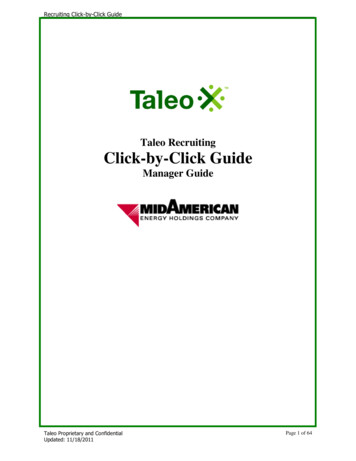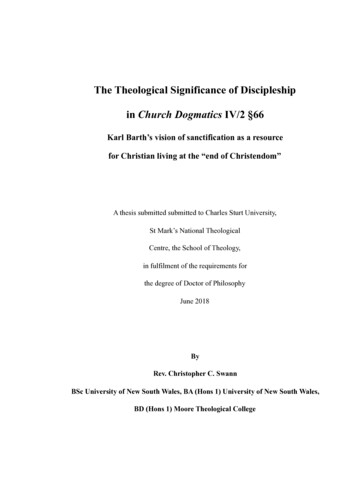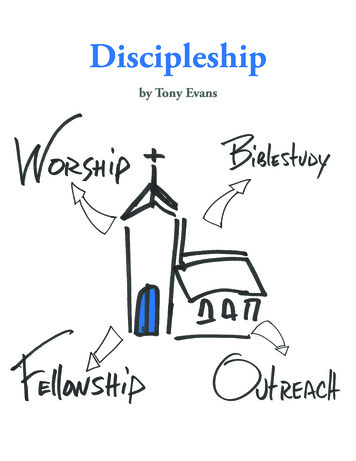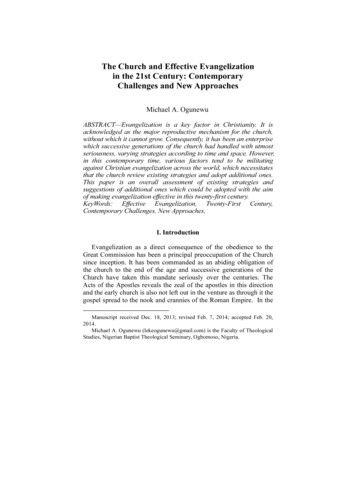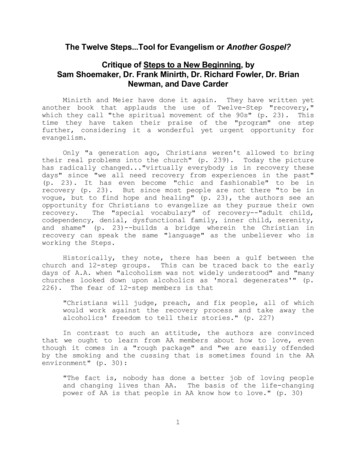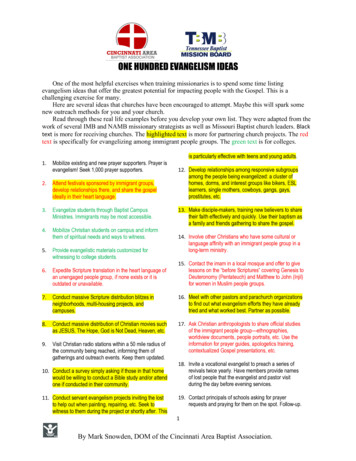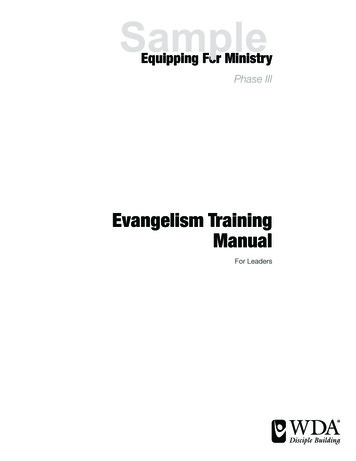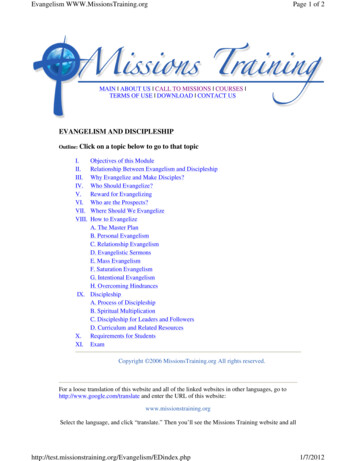
Transcription
Evangelism WWW.MissionsTraining.orgPage 1 of 2MAIN ABOUT US CALL TO MISSIONS COURSES TERMS OF USE DOWNLOAD CONTACT USEVANGELISM AND DISCIPLESHIPOutline: Clickon a topic below to go to that topicI.II.III.IV.V.VI.VII.VIII.Objectives of this ModuleRelationship Between Evangelism and DiscipleshipWhy Evangelize and Make Disciples?Who Should Evangelize?Reward for EvangelizingWho are the Prospects?Where Should We EvangelizeHow to EvangelizeA. The Master PlanB. Personal EvangelismC. Relationship EvangelismD. Evangelistic SermonsE. Mass EvangelismF. Saturation EvangelismG. Intentional EvangelismH. Overcoming HindrancesIX. DiscipleshipA. Process of DiscipleshipB. Spiritual MultiplicationC. Discipleship for Leaders and FollowersD. Curriculum and Related ResourcesX. Requirements for StudentsXI. ExamCopyright 2006 MissionsTraining.org All rights reserved.For a loose translation of this website and all of the linked websites in other languages, go tohttp://www.google.com/translate and enter the URL of this website:www.missionstraining.orgSelect the language, and click “translate.” Then you’ll see the Missions Training website and ndex.php1/7/2012
Evangelism WWW.MissionsTraining.orgPage 2 of 2other linked websites in the language of your choice. A similar translator tool is found ssionstraining.org/Evangelism/EDindex.php1/7/2012
EVANGELISM AND DISCIPLESHIP - ObjectivesPage 1 of 1EVANGELISM AND DISCIPLESHIPI. Objectives of This ModuleOn completion of this module, you should : Be able to define the terms convert, disciple, and discipleshipKnow the relationship between evangelism and discipleshipUnderstand the Biblical basis for making disciplesKnow the rewards and persecution involved with making disciplesKnow what prospects will generally respond best to our witnessBegin praying that God would reveal where he wants you to make disciplesUnderstand the master plan for evangelismKnow the process of personal evangelismUnderstand what the acronym FIRE representsState the two diagnostic questions of evangelism explosionWrite your personal testimonyState the Four Spiritual LawsMemorize the Scripture references from the Romans RoadBe able to lead a person to Christ using John 3State the five ways for spiritual growth as given on an evangecubeKnow the Scripture reference for “speaking the truth in love.”Respond to the objection that one needs to work their way to salvationExplain why Christianity is a relationshipKnow why pluralism cannot be trueUnderstand the importance of relationship evangelismKnow the meaning of mass evangelism and saturation evangelismKnow the process of discipleshipBe able to explain spiritual multiplicationName three principles that Paul exemplified in making disciplesKnow five practical ideas from Waylon B. Moore for training disciplesDevelop a brief outline for a six-month-long curriculum to train disciplesBACK TO OUTLINE ctives.html1/7/2012
EVANGELISM AND DISCIPLESHIP - Relationship Between Evangelism and Disciples. Page 1 of 1EVANGELISM AND DISCIPLESHIPII. Relationship Between Evangelism and DiscipleshipEvangelism is proclaiming the Good News of Jesus Christ to the lost. The “lost” are thosepeople who do not believe in Jesus Christ as Lord and Savior. They are like lost sheep, whicha good shepherd seeks and brings to safety (Matt. 18:12).The goal of evangelism is to win converts. A convert is one who becomes a believer inChrist; he is converted from being a non-believer to being a believer.A disciple is a convert who adheres to the basics of the Christian faith. The word "disciple"means “a pupil, someone who learns by following.” Such knowledge is more than headknowledge—it is also “heart-knowledge.” True disciples not only know about Christ, theyalso follow the teaching of Christ. In Christian theology, discipleship is the process oftraining individuals to become mature disciples. Discipleship is more than just sharinginformation—it involves developing individuals to love and obey God.Evangelism and discipleship are linked together. Evangelism results in converts, and convertsare trained to become disciples. Disciples evangelize to reach more converts, who are trainedto become disciples. So evangelism leads to disciples and disciples evangelize until theGospel is spread throughout the world.Whenever possible, discipleship should follow evangelism. Evangelism results in peoplebeing spiritually reborn (see John 3:3), so new converts are “spiritual babies.” Converts needdiscipleship in order to grow to maturity. It is not right to create a physical baby and thenabandon it. In the same way, it is not right to create a spiritual baby and then abandon it.Converts need to be trained by other Christians.Consider the relationship of evangelism and discipleship with missions. Christian missionsinvolve proclaiming the Gospel across cultures. So a missionary spreads the Gospel to apeople group or culture different from his own. Evangelism and discipleship are the processesby which mission work is accomplished. Evangelism and discipleship also occur within one’sown culture, so not all evangelism and discipleship falls within the context of missions.BACK TO OUTLINE tionship.html1/7/2012
EVANGELISM AND DISCIPLESHIP - Why Evangelize and Make Disciples?Page 1 of 3EVANGELISM AND DISCIPLESHIPIII. Why Evangelize and Make Disciples?Consider the Biblical basis for evangelism and discipleship.A. Christ Commanded It.In each of the four Gospels and in Acts, Jesus commanded his followers to makedisciples. The Great Commission is found in the following Scripture:18 Then Jesus came to them and said, "All authority in heaven and on earthhas been given to me. 19Therefore go and make disciples of all nations,baptizing them in the name of the Father and of the Son and of the HolySpirit, 20and teaching them to obey everything I have commanded you. Andsurely I am with you always, to the very end of the age." (Matthew 28:18-20NIV).15 He said to them, "Go into all the world and preach the good news to allcreation. 16Whoever believes and is baptized will be saved, but whoever doesnot believe will be condemned. (Mark 16:15,16 NIV).46 He told them, "This is what is written: The Christ will suffer and risefrom the dead on the third day, 47and repentance and forgiveness of sins willbe preached in his name to all nations, beginning at Jerusalem. (Luke 24:4648 NIV).21 Again Jesus said, "Peace be with you! As the Father has sent me, I amsending you." 22And with that he breathed on them and said, "Receive theHoly Spirit. 23If you forgive anyone his sins, they are forgiven; if you do notforgive them, they are not forgiven." (John 20:21-23 NIV).8 But you will receive power when the Holy Spirit comes on you; and youwill be my witnesses in Jerusalem, and in all Judea and Samaria, and to theends of the earth." 9 After he said this, he was taken up before their veryeyes, and a cloud hid him from their sight. (Acts 1:8,9 NIV).The importance of the Great Commission is emphasized by its appearance aspart of the last instructions of Christ to his disciples in all four Gospels. And inActs, the Great Commission is the last words of Christ prior to his ascension.B. To Save Sinners.Christ commands evangelism and discipleship so that sinners may be saved fromhell. Hell is a place of suffering (see Luke 16:19-31). Christ said to fear God,who is able to cast sinners into hell.4 "I tell you, my friends, do not be afraid of those who kill the body and afterthat can do no more. 5But I will show you whom you should fear: Fear Evangelize.html1/7/2012
EVANGELISM AND DISCIPLESHIP - Why Evangelize and Make Disciples?Page 2 of 3who, after the killing of the body, has power to throw you into hell. Yes, I tellyou, fear him. (Luke 12:4,5 NIV).Apart from Christ, people are condemned to die and go to hell (see John 3:16-18;Rev. 20:15). Those who are not saved during their one life here on earth will beeternally separated from God. Scripture says that each person lives once on earth,and then faces judgment.27 Just as man is destined to die once, and after that to face judgment, 28soChrist was sacrificed once to take away the sins of many people; and he willappear a second time, not to bear sin, but to bring salvation to those who arewaiting for him. (Hebrews 9:27,28 NIV).Jesus died on a cross to pay the penalty for sin, so that sinners could be savedfrom hell. He said that he came to seek and save the lost (see Luke 19:10). Hewants people to have the joy of eternally living with God. That joy is expressed inthe following Scripture.3 And I heard a loud voice from the throne saying, "Now the dwelling of Godis with men, and he will live with them. They will be his people, and Godhimself will be with them and be their God. 4He will wipe every tear fromtheir eyes. There will be no more death or mourning or crying or pain, forthe old order of things has passed away." (Revelation 21:3,4 NIV).Christ died to save sinners from hell, and he expects his followers to proclaim thisGood News and warn of the danger of hell. If we do not obey the GreatCommission, we are responsible for lost souls going to hell. God held Ezekielaccountable for preaching repentance.8 When I say to the wicked, 'O wicked man, you will surely die,' and you donot speak out to dissuade him from his ways, that wicked man will die for [a]his sin, and I will hold you accountable for his blood. 9 But if you do warnthe wicked man to turn from his ways and he does not do so, he will die forhis sin, but you will have saved yourself. (Ezekiel 33:8,9 NIV).[a] Ezekiel 33:8 Or inJust as Ezekiel was accountable for preaching repentance, God holds hisfollowers accountable for making disciples. The Apostle Paul recognized this,and said that he was innocent of the blood of all men because he proclaimedGod’s word (see Acts 20:26,27).When sinners are saved, God is glorified. God is victorious over sin and death.Those who were opposed to God repent and worship God.C. To Expand the KingdomChrist commanded that his followers evangelize and make disciples in order toexpand the Kingdom of God. At his first advent on earth, he ushered in theKingdom. When Christ returns, he will establish his rule over the Kingdom. See “Kingdom of God” in the training module, angelism/WhyEvangelize.html1/7/2012
EVANGELISM AND DISCIPLESHIP - Why Evangelize and Make Disciples?Page 3 of 3The church is to expand the Kingdom of God in the power of the Holy Spirit.When the church completes this Commission, Christ will return.“ And this gospel of the kingdom will be preached in the whole world as atestimony to all nations, and then the end will come” (Matthew 24:14 NIV).As the Kingdom of God expands, God receives the worship from the peoples ofall nations. So expanding the Kingdom gives glory to God (see Rev. 5:9,10,13).Expanding the Kingdom provides more fulfilling lives for those who receiveChrist (see John 10:10). Christ provides eternal security, love, guidance, andhope. When people receive Christ, they see their lives transformed. Alcoholicswho commit to Christ give up alcohol. Sex addicts who commit to Christ give upsexual immorality. Greedy people who commit to Christ share their riches withothers. Those who are spiritually poor commit to Christ and find themselvesspiritually rich.BACK TO OUTLINE vangelize.html1/7/2012
EVANGELISM AND DISCIPLESHIP - Who Should Evangelize?Page 1 of 1EVANGELISM AND DISCIPLESHIPIV. Who Should Evangelize?Who has the responsibility for evangelizing? Missionaries? Pastors? Teachers? According toScripture, all Christians should evangelize. Jesus gave the Great Commission to his elevenApostles and a few other disciples with them. Obviously this small band of followers could notproclaim the Gospel to the ends of the earth and make disciples of all nations. So the GreatCommission is for you and me and all other believers.Someone might say, “But isn’t it the job of evangelists to spread the Gospel?” Yes, evangelistsare responsible for spreading the Gospel. They have the gift of evangelism. So they are effectivein winning souls for Christ. But evangelists are not the only ones who should make disciples.Every Christian who is able to witness is commanded to witness for Christ. Only a small portionof the church has the gift of evangelism, but every Christian that can think and speak can testifythat Christ is Lord. It is through the witness of the multiplied millions of Christians that theGospel can be spread quickly to every people group on earth. Christians serve as a daily witnessto their families, friends, and co-workers.Every believer is a priest, and a priest leads people to worship God.9 But you are a chosen people, a royal priesthood, a holy nation, a people belonging to God,that you may declare the praises of him who called you out of darkness into his wonderfullight. (1 Peter 2:9 NIV).We serve as Christ’s ambassadors to non-believers (see 2 Cor. 5:20).BACK TO OUTLINE houldEvangelize.html1/7/2012
EVANGELISM AND DISCIPLESHIP - Reward for EvangelizingPage 1 of 1EVANGELISM AND DISCIPLESHIPV. Reward for EvangelizingIt is human nature to ask, “What reward will I get for evangelizing?” The Apostle Peter askedwhat would be his reward for following Christ. Jesus responded:“ . . . everyone who has left houses or brothers or sisters or father or mother [a] orchildren or fields for my sake will receive a hundred times as much and will inherit eternallife. (Matt. 19:29 NIV).a. Matthew 19:29 Some manuscripts mother or wifeThere is great satisfaction in leading people to Christ. The greatest gift that one can give is tolead a person to receive eternal life. So the work of evangelism is fulfilling. Also, as Christianstravel to various countries and lead people to Christ, such converts open their homes to theevangelists. So those who have left homes are welcomed into a hundred times more homes.Those who have left family are blessed with the love of a hundred families. And those wholeave their home for Christ have an eternal home in heaven.While there is great reward in leading people to Christ, an evangelist may also experiencepersecution and hardship (see John 15:18-21). But for those called to the purposes of God, theLord brings good out of bad experiences (see Romans 8:28). The Apostles evangelized andmade disciples, so the Jewish leaders had the Apostles flogged. Then the Jews ordered theApostles not to speak in the name of Jesus. Consider the response of the Apostles.41The apostles left the Sanhedrin, rejoicing because they had been counted worthy ofsuffering disgrace for the Name. 42Day after day, in the temple courts and from house tohouse, they never stopped teaching and proclaiming the good news that Jesus is the Christ.[a] (Acts 5:41,42 NIV)[a] Acts 5:42 Or MessiahThe Apostles rejoiced in their suffering for Christ! Proclaiming the Gospel is not easy, but thereis joy in such work. Also, converts to the Christian faith experience joy, and sometimespersecution.BACK TO OUTLINE rdForEvangelizing.html1/7/2012
EVANGELISM AND DISCIPLESHIP - Who are the ProspectsPage 1 of 1EVANGELISM AND DISCIPLESHIPVI. Who are the ProspectsWhich people should we share the Gospel with? We must be willing to make disciples ofanyone. Jesus taught his disciples to witness in their hometown, in their country, and to the endsof the earth (Acts 1:8). He said, “Make disciples of all nations” (Matt. 28:19). But not all peoplewill be equally responsive to our witness. So we should focus on sharing the Gospel to thosewho are most likely to convert to Christ.Through prayer, we allow the Holy Spirit to guide us to the best prospects for evangelizing.Within our own culture, we may be led to witness to family, friends, neighbors, co-workers, orother people that we have some relationship with. We find that certain people respond best to us.An older man may be effective in speaking with other older men. A young girl may be mosteffective in speaking with other young girls. Often, people of our own race may respond better tous than people of other races. We love people of every age, sex, and race, and we want tofellowship with all people. But we also want to see the church grow as fast as possible. So weseek out those who respond readily to the Good News. As missionaries to other people groups,we follow the Spirit and see which people respond to the Gospel. We may then be led to focuson evangelizing the people group that is most responsive.Jesus sent disciples to evangelize and told them if the people in a city did not respond favorablythat the disciples should move on to other areas (see Luke 10:10,11). In the same way, if youevangelize in the proper way, and people in a particular place do not receive Christ as Lord,simply go to another area.The Apostle Paul gave priority to evangelizing people who had not heard the Gospel (seeRomans 15:20-21). We strive to do the same.BACK TO OUTLINE reTheProspects.html1/7/2012
EVANGELISM AND DISCIPLESHIP - Where Should We Evangelize?Page 1 of 1EVANGELISM AND DISCIPLESHIPVII. Where Should We Evangelize?As a missionary, where is the Lord leading you to evangelize and make disciples? As you prepareto go to a mission field, pray repeatedly that the Lord will lead you to the place that you should go.To guide you in praying, see the website below. The U.S. Center for World Mission provides thiswebsite that identifies people groups to peration World at the following website asks for prayer to be directed toward various nations ofthe world.http://www.24-7prayer.com/ow/?skin 247For additional ideas regarding places to evangelize, talk with people at a mission-sending agency.A. Where the Holy Spirit Leads.The Spirit led the Apostle Paul and his companions to avoid certain places and to goto Macedonia for mission work (see Acts 16:6-10). The Holy Spirit warned Paul ofdanger, but compelled him to go as a witness to Jerusalem (see Acts 20:22-24). TheSpirit can also guide you to the right mission fields.B. Where the People Are.It is generally better--but not always better--to evangelize in cities and towns ratherthan in rural areas. People in the cities and towns carry the Gospel to the country.And people in cities serve as witnesses when those from rural areas come to cities totransact business. Notice that Jesus sent disciples to evangelize in towns (see Luke10:1). Paul went to population centers to evangelize. See “Strategy of Missions—Go Where God Wants You to Go” in the module “Missiology.”BACK TO OUTLINE eShouldWeEvangelize.html1/7/2012
EVANGELISM AND DISCIPLESHIP - How to EvangelizePage 1 of 14EVANGELISM AND DISCIPLESHIPVIII. How to EvangelizeA. The Master Plan.The overall plan of evangelism is to conduct evangelistic training, pray, rely on theHoly Spirit, go and witness, and leave the results to God.1. Leaders Must Train People to Evangelize.Missionaries and pastors should prompt their congregations to evangelize.Leaders set an example by evangelizing. Someone wrote, “Evangelism is morecaught than taught.” In other words, disciples catch onto evangelism by goingto evangelize with more experienced witnesses. It is good to learn the basics ofevangelism in a classroom, but most evangelistic skill is learned through practice.When an experienced witness evangelizes together with a less experienceddisciple, the disciple participates in witnessing when he feels comfortable indoing so. The disciple will learn more with each household visited.In many places, door-to-door personal evangelism produces many converts. Inother places, other forms of evangelism may be more effective.Churches that have strong outreach and discipleship programs often are thechurches that grow. If a church has an insufficient number of people to supportthe work of the church, and to support the pastor, that church may be weak inevangelism. So the pastor may need to concentrate on outreach.2. Pray.As with all ministry, the work should be preceded by prayer. Pray before going,while evangelizing, and after evangelizing. The Apostle Paul said that we shouldput on the whole armor of God to combat spiritual enemies. A key part of thatarmor is prayer.12 For our struggle is not against flesh and blood, but against the rulers,against the authorities, against the powers of this dark world and against thespiritual forces of evil in the heavenly realms.18And pray in the Spirit on all occasions with all kinds of prayers andrequests. With this in mind, be alert and always keep on praying for all thesaints. 19Pray also for me, that whenever I open my mouth, words may begiven me so that I will fearlessly make known the mystery of the gospel,20for which I am an ambassador in chains. Pray that I may declare itfearlessly, as I should. (Ephesians 6:12,18-20 NIV).One of the greatest needs in evangelism is willing workers. The harvest is plenty,but the workers are few. Before Jesus sent out the seventy-two disciples toevangelize, he told them to ask the Lord of the Harvest to send workers (seeLuke HowToEvangelize.html1/7/2012
EVANGELISM AND DISCIPLESHIP - How to EvangelizePage 2 of 143. Rely on the Power of the Holy Spirit.If we believe in Jesus Christ as Lord and Savior, we have received the HolySpirit. So we now rely on the Spirit to go ahead of us and provide opportunitiesfor us to share the Gospel. We rely on the Holy Spirit to convict people of theirsin, and to lead them to the truth of Jesus Christ (see John 16:7-11).One of the ways that the Spirit leads people to Christ is by performingmiraculous signs such as healing. I know of a group of Christians who shareChrist among Muslims. According to the Muslim faith, Jesus was a prophet. TheMuslim Scripture--the Qur’an--teaches that Muslims should study the Gospels inthe Bible. The Bible teaches that Jesus miraculously healed many people. So thisgroup of Christians simply goes to the Muslims and prays in the name of Jesusthat their sick people be healed. When the sick are healed, some of the Muslimsbelieve in Christ. The Muslims have seen the power of Christ working throughthe Holy Spirit.Jesus ministered in power.37 You know what has happened throughout Judea, beginning in Galileeafter the baptism that John preached-- 38 how God anointed Jesus ofNazareth with the Holy Spirit and power, and how he went around doinggood and healing all who were under the power of the devil, because Godwas with him. (Acts 10:37-38).The Apostle Paul spread the Gospel by the power of the Holy Spirit.4 My message and my preaching were not with wise and persuasive words,but with a demonstration of the Spirit's power, 5so that your faith might notrest on men's wisdom, but on God's power. (1 Cor. 2:4,5 NIV).I have seen and heard of people being miraculously healed by the power of theHoly Spirit. But not all people are physically healed. It is not God’s purpose thatpeople be continually healed so they live forever in this world. So we pray in thename of Jesus for healing according to the will of God.4. Take the Church to the People.Evangelism generally is not bringing people to the church. Rather, evangelism istaking the church to the people. Evangelism involves going out and presentingthe Gospel, and winning converts. Once the people are believers, they will wantto meet with other Christians of the church.5. Leave the Results to God.We pray and evangelize in the power of the Holy Spirit. We follow evangelismwith discipleship. Then we leave the results to God. We can’t save the lost. Wecan only present the Good News, and rely upon God to save sinners.B. Personal EvangelismMass evangelism occurs among large numbers of people, but personal ism/HowToEvangelize.html1/7/2012
EVANGELISM AND DISCIPLESHIP - How to EvangelizePage 3 of 14involves sharing the Gospel with one person or a small group of people.When Christians intentionally go out to evangelize, they should go in pairs (seeLuke 10:1). Two men may go together. Two women may go together. Or a husbandand wife may go together. Going in pairs is more secure and effective in evangelizingstrangers. Generally, it is not recommended that a single man and a single woman gotogether to evangelize. Christians should avoid even the appearance of impropriety.In addition to planned evangelism, personal evangelism may occur on a daily basis, aswe go about our routine activities. The Great Commission as given in Matthew 28:19says, “Go and make disciples.” But the Greek word translated as “go” implies that we arealso to make disciples as we go. We should pray that God opens our minds foropportunities in witnessing to anyone that we encounter.In order to evangelize as we go about our daily activities, we need to know how to turna conversation toward spiritual things. Following are some examples:If you are talking with someone on a beautiful day, you might remark, “Godcertainly provided a lovely day for us to enjoy, didn’t he?”If a person complains of their sickness, you may say, “I’m sorry that you are sick,and I want you to feel better. Jesus has healed many people.”If a person is worried, you might say, “Most of us worry about things, but I’vefound a way to relieve my stress. I ask Jesus to remove my anxiety, and hecertainly helps me. Could I share some Scripture that explains this? (Then shareScripture such as Luke 12:22-31).If the listener seems responsive to spiritual things, you should proceed to share more. Itis generally better to proceed slowly when sharing the Gospel. The evangelist speaksand allows the listener to respond. Then the evangelist speaks again, in response to whatwas said. Someone compared evangelism to feeding pigeons in a city park. A young boytook a loaf of bread and threw the whole loaf to the pigeons, scaring them so they flewaway. Then an old man picked up the loaf of bread, and asked the young boy to sittogether quietly with him on a park bench. The old man proceeded to break off a fewcrumbs of bread from the loaf and tossed them out onto the ground. Soon a pigeon flewdown and began to eat the bread. The man tossed a few more crumbs out, and morepigeons came and began to eat. Within a few minutes the whole flock of pigeons waseating. In the same way, we can offer a little spiritual truth to a person, and see if thatperson is interested in receiving more.The acronym FIRE is a useful tool to remember in opening a conversation andproceeding to evangelize. FIRE stands for the following terms.Family. Begin by asking, “Do you have a family?” Most people like to talk about theirfamily—especially their children and grandchildren. But it is not good to pressuresomeone if they don’t wish to talk about a divorce or some other family issue. Aftertalking with them about their family, you may then briefly talk about your ownfamily.Interests. Ask, “What do you do when you have free time?” Notice the person’shousehold or surroundings. Does the person appear to have a hobby? Talk about whatinterests the /HowToEvangelize.html1/7/2012
EVANGELISM AND DISCIPLESHIP - How to EvangelizePage 4 of 14Religion. Ask, “What is your religion?” Or, “Have you thought much about spiritualthings?”Evangelism. If the listener is not a Christian, you may have an opportunity to share theGospel. You can judge this by the listener’s responses.1. Evangelism Explosion.If you are not sure that a listener is a Christian, you may wish to ask twodiagnostic questions. Dr. James Kennedy offers these questions as part of anevangelistic method known as Evangelism Explosion. The questions follow.1. Do you know for sure that you are going to be with God inHeaven? Depending on how the person answers this question, youmay need to ask question 2.2. If God were to ask you, “Why should I let you into My Heaven?”what would you say?These questions and the evangelistic methods that accompany them are availablein five languages. Click on “Do you know?” at the following link:http://www.eeinternational.org/The evangelism explosion tract is available online in an easier-to-follow formatat:http://www.menorah.org/eetract.htmlThe two diagnostic questions help you to know whether or not the listener is aprofessing Christian with at least a basic understanding of Christian theology.And they give you an opportunity to share the Gospel.2. Personal Testimony.Instead of going directly to Scripture when a listener responds to the twodiagnostic questions, you may sometimes share your personal testimony. If thelistener is unsure that he would go to be with God when he dies, you can say,“May I share how I received assurance that I will go to heaven when I die?”Generally the listener will allow you to give your testimony. Your testimonyshould be organized as follows.a. What my Life was like before I became a Christian.b. How I became a Christian.c. How my life has changed as a result of my trusting Jesus as my Lordand Savior.d. How you can become a Christian.In order to be more organized, I recommend that you write out your testimony.Develop a written testimony that you can present in about three minutes. Alsodevelop a version of your testimony that you can present in about five or sixminutes. If you have a lot to say, you may also want to develop a longer /HowToEvangelize.html1/7/2012
EVANGELISM AND DISCIPLESHIP - Ho
Jan 07, 2012 · EVANGELISM AND DISCIPLESHIP II. Relationship Between Evangelism and Discipleship Evangelism is proclaiming the Good News of Jesus Christ to the lost. The “lost” are those people who do not believe in Jesus Christ as Lord and Savior. They are like lost sheep, which
